Magazine 2024

Then and now
Past perspectives meet the modern student experience
Graduates come back to Preston for a special Alumni Reunion
Providing superpowers through fashion
From Big Brother to proud author: A.J. West



Then and now
Past perspectives meet the modern student experience
Graduates come back to Preston for a special Alumni Reunion
Providing superpowers through fashion
From Big Brother to proud author: A.J. West

I’m honoured to introduce the 2024 edition of our Alumni Magazine, which is my second since returning to the University of Central Lancashire as Vice-Chancellor.
For some of you this will be the first Alumni Magazine you’ve received from us in a while. As you know, we recently ran a campaign to reach out to alumni we’d lost touch with, and I’m delighted that thousands of you have now reconnected and are again part of our alumni family.
Speaking of reconnecting, I was honoured to attend the Alumni Reunion event that took place last July to which we welcomed alumni from the 1950s, when the University was known as the Harris College, through to those who attended during our years as a Polytechnic, and right up to the present day. It was fantastic to bring together so many of our alumni to share their memories of studying with us – you can read more about the Reunion later in this edition.
Since the last Alumni Magazine, we’ve continued to develop several new initiatives at the University, but I wanted to highlight specifically the pleasing progress achieved with our new School of Veterinary Medicine. I’m delighted that the first phase of building work for the new School is complete. This has involved transforming part of Greenbank Building to house simulated consultation rooms, a dedicated area for kennels and multi-use teaching rooms. Additionally, x-ray, ultrasound and diagnostic facilities have been installed, along with a hydrotherapy treadmill and
physiotherapy suite for the rehabilitation of dogs. It’s a world-leading facility and I look forward to the final and most significant new build element of the project being unveiled soon.
I want to stress how valuably the University regards its relationship with you, our alumni. You’re a part of our history as well as our future and we look to you and your experiences to shape the way we move forward as an institution. This is particularly evident when we ask our graduates to take part in the annual HESA Graduate Outcomes Survey, the results of which demonstrate the value of higher education. Your input is greatly appreciated, so please do continue to take part in these surveys and feedback to us more generally – we’d be pleased to hear from you.
We’d also love for you to return to study with us as and when the time might be right. We would be delighted to discuss any options you are considering as well as the modes and programmes of study that we have available.
So, thank you for staying in touch, and updating us on your life’s stories and journeys – it’s always great to hear from you.
Until next time, Graham


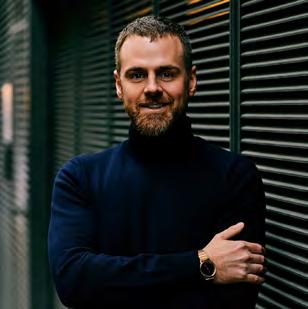
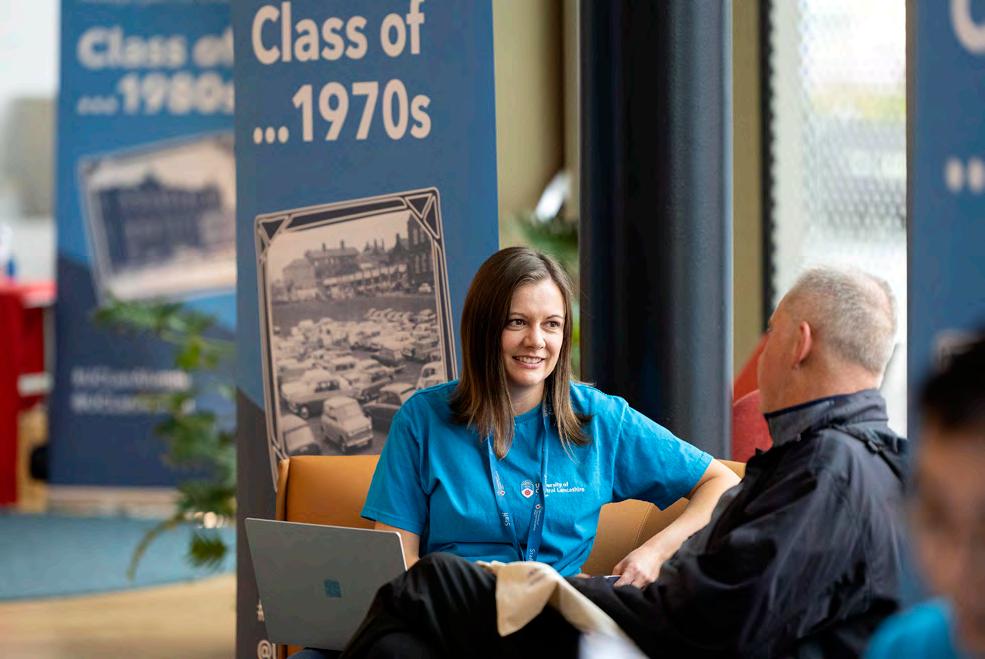
Hundreds of University of Central Lancashire alumni travelled from far and wide to relive their student days at a special celebratory event in Preston. Graduates from the 1940s right through to the 2020s took a nostalgic walk down memory lane at the institution’s first reunion event for all alumni from all subjects and all years.


The day was jam-packed with a range of tours and guest lectures and culminated in a talk from Honorary Fellow and Cold Feet actor John Thomson.
One of the attendees was 90-year-old Rosemary Robinson who graduated in shorthand and typing in 1948 and went on to work at Leyland Motors. She said: “It was Harris College back when I came but we all called it going to school. All the girls were on one floor and the boys on another. Things have changed a lot since then, but I like coming back and speaking to other people who studied here at the same time.”
A couple who met at University in the early 2000s travelled from Derbyshire to show their three young children where it all started. It was 2005 forensic science graduate Amy Bishop-Powell and her 2004 motorsports engineering graduate husband Paul’s first trip back to Preston.
Amy said: “I can’t believe how it’s changed so much since we both left. It’s just absolutely fantastic to see how it’s developed and what great facilities are here for today’s students. It’s been really lovely to show Reuben, Logan and Saffron where mummy and daddy met.”
UCLan’s Canoe Club in the late 1990s brought together now husband and wife Chris and Hannah Bull. The couple, who have two teenage daughters, returned to the campus with friend and fellow alumnus Martin Stork.
History graduate Hannah said: “I’m a primary school teacher so I keep coming back with my school to the University’s fantastic Lancashire Science Festival, but I wanted to come along to be able to look around and revisit some of the old haunts. It’s been
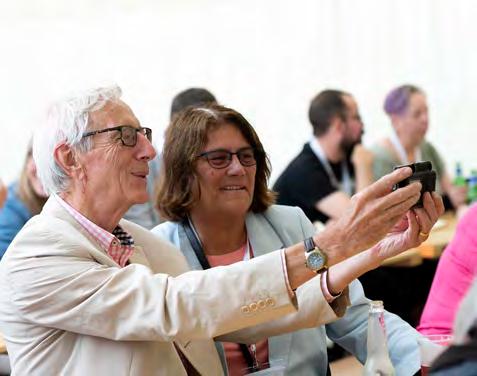
a great opportunity to think back and talk about such happy times.”
An MBA graduate, who combined her studies with working for BAE, took the opportunity to see the recent campus developments first-hand and to hear how the University is producing the next generation of industry professionals.
Maria Sumner, who completed a Diploma in Management Studies in 1995, her MBA in 1997 and a Postgraduate Certificate in Criminology and Criminal Justice in 2003, commented: “There have been lots of developments recently, so I wanted to see for myself what has been created and it’s wonderful. It was also really lovely to hear from the Vice-Chancellor, who has been involved with the University for a long time and is clearly passionate about its future.”
Entertainment throughout the day included a silent disco, a dance performance from alumni and music from the University’s Samba Drummers while artefacts from the University’s archives were also on display.
Actor and comedian John Thomson, who grew up in the city, was the star attraction for many in attendance. He said: “I was truly humbled and so proud when the University awarded me with an Honorary Fellowship in 2017. With that position comes a responsibility to help the University in any way I can so I was delighted to be asked back to take part in such a special event.”
The University has a global alumni community of more than 200,000 graduates. At the event, graduates travelled from across the UK, including Cornwall, London and the Midlands.
“There have been lots of developments recently, so I wanted to see for myself what has been created and it’s wonderful.”
Hannah, history alumna
Maggie Wild, the University’s Head of Development and Alumni, added: “It was fantastic to hear so many heart-warming stories from graduates who studied at Harris College, Preston Polytechnic, Lancashire Polytechnic and the University.
“The hundreds who attended hold the institution so close to their hearts and it was clear to see the love they have for the place has never diminished. Seeing some of our oldest alumni, who are now in their 90s, chatting to a couple of 2023 graduates was lovely as they’ve had such different educational experiences, but the University of Central Lancashire has drawn them together.”

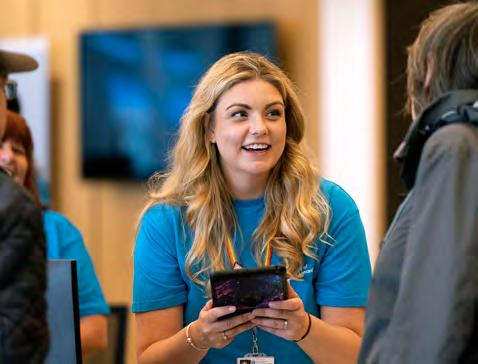
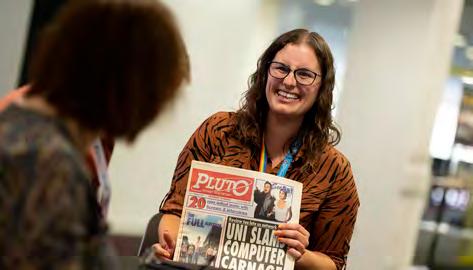
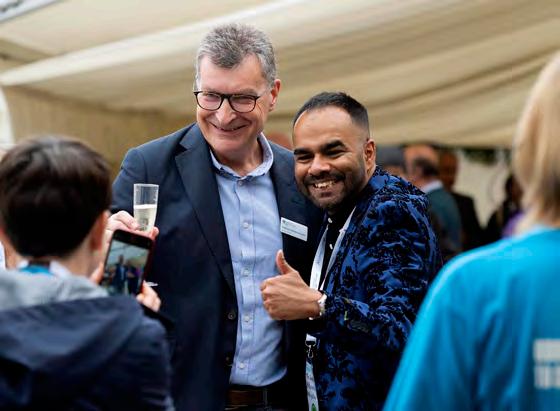
“The hundreds who attended hold the institution so close to their hearts and it was clear to see the love for the place has never diminished.”
Maggie Wild, Head of Development and Alumni

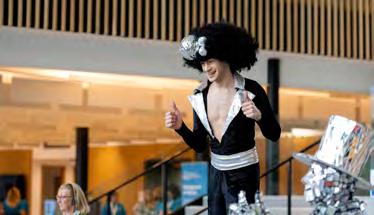


Former members of the Harris Institute and Harris College were welcomed back to the University of Central Lancashire to take a walk down memory lane to reminisce about their time as students in Preston.
All attendees studied at ‘The Harris’ with the oldest studying in 1948 and the youngest in 1969, just a few years before the University became Lancashire Polytechnic in 1973.
Guests were given a talk on The Histories from the Harris, a publication written by Professor Keith Vernon, Principal Lecturer and University Historian, and Helen Howell, a MRes History alumna.
The publication details the fascinating stories of alumni from the very last classes of the Harris Institute prior to the change of name to the Harris College in 1953, a time when Preston was a thriving and commercial town. Many of the alumni who feature in the booklet attended the reunion and all look back fondly at their time here.
After the talk, guests were treated to afternoon tea and a performance from the University’s Chamber Choir who delighted with a medley of hits from The Beatles. Speaking of the event, 1963 alumna, Pam Potter (née Platt), said: “It was great to see many of our friends from the Harris Institute, and meet new friends as well.”



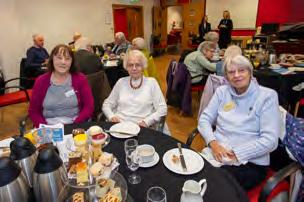
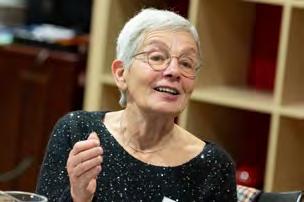
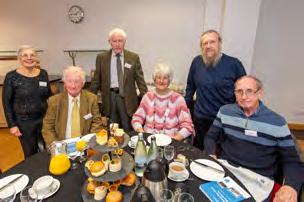
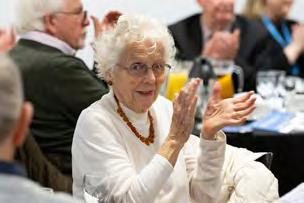

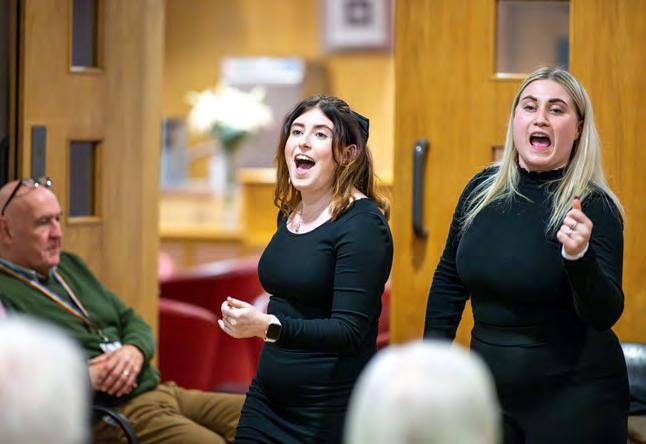
If you attended the Harris Institute or Harris College and would like to stay connected, contact us on alumninetwork@uclan.ac.uk or call 01772 892344.
“Our Harris alumni are so precious to us and show the long-lasting impact of education throughout life. They are a delight to spend time with and a joy to host, making this event a highlight of our year.”
Maggie Wild, Head of Alumni and Development

My journey from the Harris and beyond: John Eastham tells his story of travelling the world
“Even today, I frequently look back on my three years at the Harris Secondary Technical College as my salvation. It was the happiest day of my life when I received the letter stating I’d passed. You can’t imagine my relief and extreme happiness. I was to leave one of the poorest and awful Catholic schools in Preston, where religion and corporate punishment were its only hallmarks. My heart leapt for joy on the first day in assembly when our Headmaster addressed the new intake with the words “In this school, we do not have religious education or corporal punishment.” I thought “whoopee” and did a double internal somersault.
The teachers were wonderful and knew how to teach and taught us well. They encouraged us to learn and created an infectious atmosphere of wanting to learn more. They were all particularly great in their respective subjects and I can remember all their names. Mr Jock Hulse was supposed to teach us woodwork and a particular maths subject, which he did to a limited extent, but spent most of his time teaching us how to be ‘responsible’ citizens. He taught us how to behave as young men of a ‘privileged’ school and how to show respect to others. I left the Harris in 1954 with a first-class Distinction Leaving Certificate but because I wanted to be a surveyor, like my father, I remained at the Harris for a third year to prepare for the GCE examinations, thus bringing me up to grammar school level.
Having obtained the GCE requirements to satisfy the Royal Institution of Chartered Surveyors (RCIS), I left the Harris and went part-time to the College of Building in Liverpool and was awarded the Leigh-
Gregson Memorial Prize for a student with the best record in a surveying course. In 1957 having passed the first RCIS examination, I emigrated to New Zealand where I worked as a trainee land surveyor. As there was no RCIS course in Wellington or Auckland, I continued my studies by ‘correspondence’, now known as distance-learning, with the College of Estate Management.
I returned to the UK in 1959 and took my INTER RCIS examination and then found employment with a surveying practice. I then continued with my final studies and in 1961 I qualified as a Chartered Quantity Surveyor. I wanted to go to the Middle East, and in 1964 I went to Beirut, Lebanon, to take a job with a multi-disciplinary practice of architects, engineering and surveyors called Dar Al-Handasah. My two-year contract extended to 15 years working in Kuwait, Oman, Iraq and Saudi Arabia with British and Swedish Consulting Engineers. I was appointed Chief Quantity Surveyor on the Kuwait Water Distribution Project in 1972 and then Contracts Advisor with Skanska in 1977 on the Port Extension of Jeddah.
Of the 15 years, I spent two years in East Africa with Sweco on the construction of an underground hydro-electric power station, the most interesting contract of my career. I eventually moved back to Preston, established my own practice, and formed a development company to fund my practice. In 1983, I become the Managing Director of an established joinery firm that I expanded to a medium-sized construction company employing 30 craftsmen. We worked mainly on churches, listed buildings and ancient monuments and I sold the company in 2004 and returned to private practice.
During my time in the Middle East, I learnt French and colloquial Arabic. I read Law as an external student at London University, obtaining my degree in 1974, the same year I was recommended for Fellowship of the RCIS. In that year I was also appointed a Chartered Arbitrator. Also, during this time, I was commissioned and gazetted as a Second Lieutenant in the Royal Artillery and completed my part-time Army career as a Second in Command of the Duke of Lancaster’s Own Yeomanry in 1991. I was appointed to the Magistracy in 1984 until ‘forced’ retirement in 2009 when I reached the young age of 70, having served for 25 years.
And it all began at the wonderful Harris Secondary Technical College in 1952. At that rotten lousy school pre-Harris, one teacher said, “I’d end up in Prison”, and I did, as a visiting Magistrate!”
The history of journalism education at the University of Central Lancashire goes back to 1962 with a predecessor institution, the Harris College. Traditionally, journalists learned their trade as apprentices in newspaper offices until the 1960s when things began to change. With the rise of television, many journalists who traditionally trained at newspapers were moving into the new world of TV news, leaving a vacuum in print media. So, in 1962, we worked with the National Council for the Training of Journalists (NCTJ) to create the first journalism programme in England, a part-time course which allowed apprentice journalists to get a recognised qualification whilst working.
Broadcast news continued to grow through the 1960s and 70s, absorbing more newspaper journalists. It was an exciting time, where everything was new, and everyone was figuring things out as they went along. That’s where we came in. As François Nel, Reader in Media Innovation and Entrepreneurship, School of Arts and Media, says of this time: “The TV industry needed some help retraining these traditional print journalists to work in TV. We worked with the TV companies to solve this problem together and we’ve done remarkably well since then, continually helping people develop the skills to get into the workforce.”
This is mirrored by the development of our Journalism programme over the following decades.
The Harris College became Preston Polytechnic in 1973 and then Lancashire Polytechnic in 1984. Each change spurred us on to develop more advanced and innovative courses in print and broadcast media, at both undergraduate and postgraduate level.
Since 1992, when we became the University of Central Lancashire, we’ve gone from strength to strength. Our Journalism team, all of whom still work in the industry, has built an excellent reputation for offering innovative, high-quality courses confronting the vital issues of the day. That’s why we have such a distinguished group of alumni, which includes respected broadcasters like Victoria Derbyshire and our own Chancellor, Ranvir Singh.
Contributors

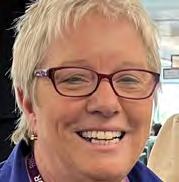

1962: The first day release course for trainee journalists (part of a three-year apprenticeship) is approved by the National Council for the Training of Journalists (NCTJ).
1966: Day-release becomes block-release, with more concentrated tuition.
1969: A new NCTJ full-time, one-year, pre-entry exam course launches.
1973: The Harris College becomes Preston Polytechnic.
1981: The first Postgraduate Diploma (PGDip) in Radio and Television Journalism in the UK is launched offering advanced broadcast journalism skills.
1984: As Preston Polytechnic becomes Lancashire Polytechnic we move into Colonial Building’s new newsroom environment.
1989: The Centre for Journalism is established in our Lancashire Business School.
1991: Our new 20 place BA (Hons) Journalism course, among the first of its kind in the UK, receives 3,500+ applications.
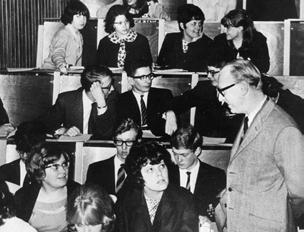
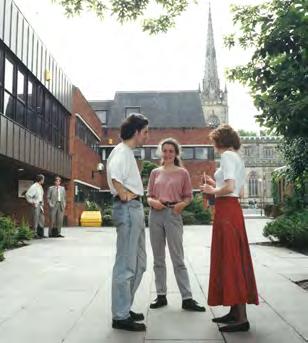
1992: Lancashire Polytechnic becomes the University of Central Lancashire.
1999: A cutting-edge MA Online Journalism course launches recognising the impact of digital technology on the industry.
2004: MA Magazine Journalism and BA (Hons) Sports Journalism courses launch, among the first of their kind in the UK.
2004: The Journalism Leaders’ Programme for working journalists to continue professional development is launched.
2017: Journalism alumna, Ranvir Singh, is appointed Chancellor of the University of Central Lancashire.
2021: The Journalism Leaders’ Programme is relaunched as the Journalism Innovation and Leadership Programme.
2022: Celebrated the 60th anniversary of Journalism programmes.


Today we’re still true to our ethos. We work closely with industry to develop courses that give them the workforce they need. Students get to meet potential employers long before they graduate, so they’re prepared and ready for work in the real world. Tom Bedworth, one of our 2022 MA Multimedia Journalism graduates met his current employer, BBC Breakfast, long before graduation. But, like most journalism and media students, he didn’t jump straight to the big time in a flagship show, spending 22 months working in local news. He said: “When you’re training you have a certain view of how things will be, but of course it’s always different. You’ve got to be prepared to work hard, start small and you’ll then get a really broad variety of work to do. My course was great because it prepared me for that, covering all aspects of journalism, both written and presenting, in front of and behind the camera. You’re not just going to waltz into a big TV job.”
Both Tom and Senior Lecturer in Broadcast Journalism, School of Arts and Media, Gerrie Byrne agreed on the importance of an industry-education feedback loop to give young journalists the best chance of success. Tom took full advantage of the opportunities he was offered, using our regular cJAM event to pitch to industry leaders and get their input to his work. “It was brilliant’, I met my current BBC boss at the cJAM event. It was clear that the University had invested heavily in the course, and us, to give us the proper training we needed to succeed, whatever we ended up doing.”
Gerrie explains why this is so important. “When I studied at the University, in the dying days of typewriters, I had a choice between print and broadcast journalism,” she says. “Today news is the same but it’s the delivery that’s changed, and it’s the delivery that counts. Journalists are getting their stories in the same way, using the same methods and
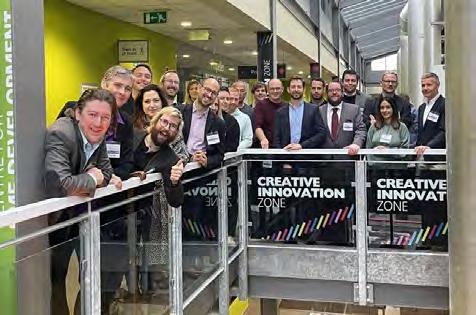
tools, but we now need to write and edit for X and the like, as well as different versions for broadcast, such as a two-minute TV feature, a radio edit, a shorter version etc.”
This means that Journalism students need ‘skills across the board’ to produce all these different types of content. “For example, we took our second-year students to Myerscough College to work with the Blind Golfers’ Association on a story that could be delivered across all media,” Gerrie told us. “They produced lots of different types of content, written and recorded in different lengths for different formats, because that’s what’s needed today. It’s not about print or broadcast or digital, it’s about all of it and with that range of skills our students have the best chance of success.”
Of course, with an industry that is becoming more tech-reliant, education needs to reflect that. “We’ve put a lot of effort into investing in technical equipment that matches what industry uses,” Gerrie says. “And that gives our students many transferable skills as well. Some students find that what they wanted when they were 18 is not what they want now, so we give them a broad range of skills which makes them highly employable across lots of areas.”
“It was brilliant’, I met my current BBC boss at the cJAM event. It was clear that the University had invested heavily in the course, and us, to give us the proper training we needed to succeed, whatever we ended up doing.”
Tom Bedworth, alumnus and BBC Journalist
Technology in the industry has its own challenges though. With the internet, journalists can do a lot of the traditional legwork, tracking down stories and getting face-to-face interviews from their desks, especially at the initial research stage of a story. But Gerrie feels that traditional methods are still important. “We do lots of role playing around this,” she says. “We set up telephone calls to build student resilience with volunteers who roleplay different emotions (upset, angry etc) at the other end of the line or camera. It’s not just about writing skills. We still need to fact check, meet real people face to face and do the job properly, especially in today’s world of flexible truth and rapid change.”
Journalism at the University isn’t just about preparing students for the industry, it’s also about developing the industry itself. François Nel explains that: “In times of drastic change, such as is happening now, it’s not enough to train from the bottom up, so when the industry began to wrestle with the challenges of digital and new technology, they came to us again. Now we’re working together on applied projects, including lots of exploratory work, research activities and long-term ongoing projects, all work which is providing insights for industry.
“But action is also needed. We need competent, confident leadership to make it happen so it’s a step
change to work with everyone across the industry at all levels to keep their learning up to date.” In answer to this challenge, François leads the University’s Journalism Innovation and Leadership Programme (JIL), offering a flexible, modular approach to personal development for industry professionals. “It’s distinctive because it’s all about applied learning which is great for the individual and their employer’s business,” he says. “And it’s unique. No one else in the world is doing this, working with industry people for lifelong learning in small packages over time so they don’t have to commit to one course and one degree.”
JIL is building deep connections within the heart of industry as well as paying forward. Many of its graduates join the board alongside industry advisors to help develop the programme, devise the research agenda to solve industry questions, and act as guest speakers and formal mentors. One alumna even donated a scholarship when she graduated as she wanted to pay forward her great experience on the programme which helped her develop her business.
“It takes a village to raise a child,” François says, “and that is what our JIL community is all about. We do ‘lunch and learn’ events online, so anyone interested can participate. We want to know what people want to hear about or even speak about. It’s all about collaborative community and we want people to get in touch and get involved.”
With an industry in the midst of deep change, from different audience needs and behaviours to the techniques and technologies used to deliver news, what does the future hold? A big topic in all creative industries right now is the use of artificial intelligence. From striking Hollywood actors to the worlds digital experts warning about the potential destructive power of AI in the wrong hands, it’s not getting a good press. But is the news all bad? What does the press itself say about AI and its potential influence on the media industry? All three of our contributors take a practical view.
For Journalism, François points out that, right now, AI is about “Advanced applied statistics created and deployed by humans. And we’ve been doing that for a long time using various methods. Think spell checking or Google searches - AI is simply the latest manifestation of that.”
For Gerrie, “AI is an excellent research tool. It’s perfectly legitimate to use within journalism and we teach our students how to use it in the right way. I’d even say it’s great as a springboard for generating initial ideas that you can then go off and research. For instance, you can ask it to suggest ten sources for a documentary on homelessness and the results could offer all sorts of unexpected story angles that you might not have considered looking at. But it doesn’t mean you shouldn’t think of ideas yourself, just use it to bounce ideas around. It’s about using AI in a creative and truthful way while being aware of how it can help, hinder, or be manipulated.”
And Tom, as a journalist early in his career, feels that AI, while exciting and a bit scary, isn’t a big threat to the jobs of journalists themselves. “AI can’t interview someone face to face,” he says. “It can’t spend time getting to know someone, building a relationship with them, putting them at ease before you interview them. AI can’t read the subtle nuances of human communication through body language and tone.
And it can’t make an informed decision on the best approach to a story depending on the individual people involved. AI will always need an editor, will always need a human being to sense check it. That will be the difference between good and bad journalism.”
But while François says that “there’s no ghost in the machine” he warns that, because of where AI is in its development, there’s a whole range of challenges and opportunities to understand.
“At the moment, AI is like a knife, it can be a useful tool or highly dangerous.” François said. “Think about cars. Right now, we’re at the Model T4 stage of the car, where we’re figuring out the responsibilities of drivers, manufacturers, road builders and governments. We have yet to decide which side of the road we should drive on, who should drive, age limits, speed limits and road signage etc. It’s always the same with anything new that people haven’t experienced before, so we need to collectively figure it out. We can’t just let everyone do their own thing. We can’t just let Henry Ford (or Microsoft or Google) decide everything.”
Gerrie agrees: “We’re working on this in the world of journalism, but there’s definitely a need for a common set of guidelines about AI usage. We need to understand and manage what could be used to misinform as much as inform. The nature of journalism, with its fast pace and strict deadlines means it can be difficult to fact check.
“For journalism, we’re in the AI ‘wild west’ right now. The rules are slowly emerging and may not settle until AI becomes just another useful technology that we take for granted, just like cars, or social media or bank accounts. But the caveat, as with any new technology, is that we can use AI for good or bad, it doesn’t use us So, it’s up to us to use it responsibly and this is where we have the power if we take the time to question the content we’re reading, viewing or listening to.” As François says, “People forget that they have agency –we create the future, it is not done to us.”
“And it’s unique. No one else in the world is doing this, working with industry people for lifelong learning in small packages over time so they don’t have to commit to one course and one degree.”
François Nel, Reader in Media Innovation and Entrepreneurship
Ranvir Singh, Chancellor of the University of Central Lancashire and Journalist
Ranvir Singh was born in Preston and gained a degree in English and Philosophy before attending the University of Central Lancashire to study for a postgraduate qualification in journalism.
After graduating, Ranvir worked at BBC Radio Lancashire before joining BBC Radio Manchester, where she worked as a newsreader, reporter and drive-time presenter. During the 2002 Commonwealth Games in Manchester, she fronted the station’s flagship show at breakfast.
In 2004, Ranvir turned her attention to television and started working for BBC North West Tonight and BBC News 24. Her skills were utilised across various programmes, working on Manchester Passion, a BBC Three live programme, and the BBC One Election Night Special, reporting with David Dimbleby. Later that year, she was appointed as the Education Reporter for North West Tonight.
By 2007, Ranvir was promoted and was working as co-presenter alongside Gordon Burns. She became a familiar face on the award-winning show, winning the prize for Best Regional On Screen Talent at the Royal Television Society’s North West Awards. Combined with regular presenting roles on BBC Radio 5 Live, she covered everything from major sporting events to political fracases.
After the birth of her son, Ranvir made the decision to move from the North West to London to work for ITV as part of morning news programme, Daybreak, now Good Morning Britain. She’s covered a wide range of national and international news and counts her most memorable moments so far as reporting ahead of the G20 from Sierra Leone’s slums, appearing on the University Challenge Christmas Special and meeting Kermit the Frog.
In 2020, Ranvir took part in BBC One’s Strictly Come Dancing, and alongside her role as Political Editor for ITV’s Good Morning Britain, Ranvir also presents Eat, Shop, Save for ITV and often presents Lorraine.
Ranvir was appointed as Chancellor of the University of Central Lancashire since 2017, a moment she said, “made her proud”.
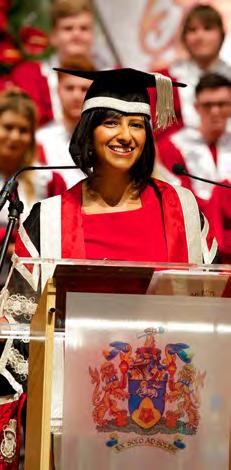
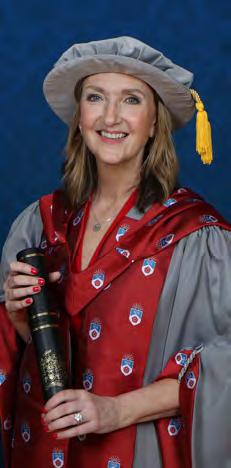
Born in Ramsbottom, Victoria graduated from the University in 1991 with a Postgraduate Diploma in Broadcast Journalism and began her career on BBC local radio before joining BBC Radio 5 Live in 1998 for a very successful 16 years.
Her television career has seen her conceive and present the eponymous Victoria Derbyshire current affairs programme on BBC Two and, more recently, presenting Newsnight. She’s covered some of the world’s biggest news stories. From 9/11 and the Paris Concorde crash to the Grenfell Tower fire and Manchester Arena bombing, Victoria continues to deliver accurate, trusted journalism to global audiences. She now also co-hosts the critically acclaimed Ukrainecast podcast, covering the war in Ukraine.
Victoria appeared in the 2020 version of I’m a Celebrity Get Me Out of Here and her TikTok videos have been watched millions of times. She also powerfully documented her diagnosis and treatment of breast cancer, making a series of video diaries to help raise awareness of the disease and encourage people to check for symptoms.
In 2023, Victoria was awarded an Honorary Fellowship by the University of Central Lancashire, saying it was a “massive privilege”.
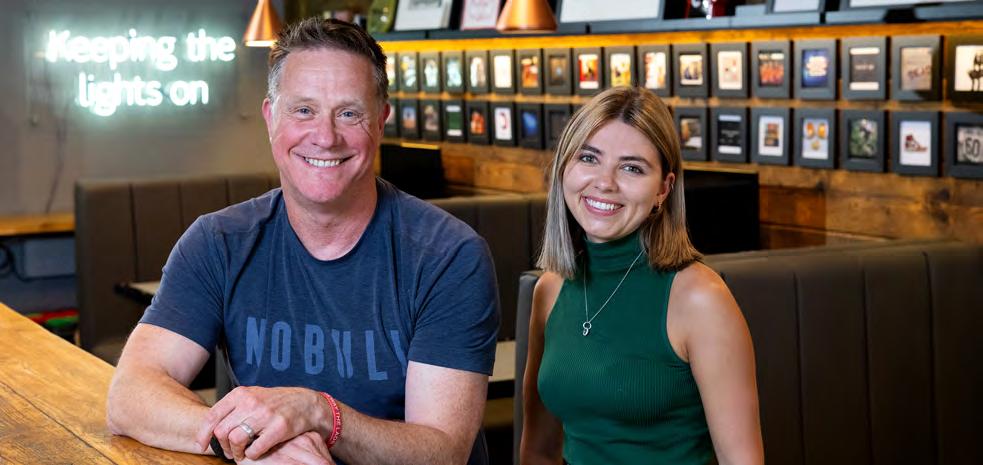
University life has changed in many ways over the years. For one thing, since our founding in 1828, we’ve been almost every type of educational institution it’s possible to be. From an institute to a college to a polytechnic, to the proud university we are today. So, what’s different? And what’s stayed the same? We thought we’d compare.
Keith Noble joined Lancashire Polytechnic in the late 80s to study a BA (Hons) Graphic Design after falling in love with graphic design when studying Foundation Art and Design at Sunderland Polytechnic. He’d “never heard of Preston” but came on the recommendation of a college lecturer and the reputation of the course. Darcy Tromp applied to the University over 30 years later because of the sandwich placement option, meaning she’d get valuable work experience as part of her degree. Unfortunately, this wasn’t meant to be. The COVID-19 pandemic struck, and work experience wasn’t an option due to government restrictions. However, both stories ended in success with Keith going on to be a Director at creative agency, Forepoint Ltd, and Darcy now works as a Midweight Designer at Forepoint, keeping it in the University of Central Lancashire family so to speak.
Keith’s and Darcy’s journeys to their careers in graphic design are similar. They both credit their time at college where they discovered their love
of the subject and excelled in their field. They then both chose the University based on reputation, recommendation, and the opportunity of work experience. Darcy said: “The course provides valuable connections with design agencies worldwide. Through conference weeks and degree shows, students have the chance to meet and interact with talented designers, fostering excellent networking opportunities. Moreover, the tutors are incredibly supportive and helpful, providing guidance for students to pursue a career in graphics.”
Keith said his placement year was “life-changing” where he worked at David Davies Associates for Stuart Baron, a University of Central Lancashire graduate. He said: “Agency life became real and gave me the extra drive and appetite to push on through my final year, achieving a 2:1 and landing my first job in the business.”
He continued: “Preston Graphics’ had an incredible reputation in the industry, and it was also a
‘sandwich course’ which meant it included a sixmonth work placement/internship as part of the course, the best of both worlds. And because of the long-running relationships with some amazing design agencies there was also vast network of alumni to tap into and get to know the ‘Preston Mafia’ as it was affectionately known.”
Life after University for both Keith and Darcy was all about getting as much work experience as possible for their portfolios. Reflecting on the importance of this, Keith said: “Grades don’t really matter in the real world. Probably not the best statement to add into a university alumni magazine. But what I mean is, the best thing about studying a degree in Graphic Design is that whatever grade you get, you always come out with a portfolio of work that you did and should be proud of. So, sharing that with a future employer and talking it through shows firsthand what you’re capable of, it’s way more than just a degree certificate.”
This was important to Darcy too. After achieving a first-class Honours degree she was aware that she needed to build her portfolio and reached out to agencies to gain work opportunities. Shortly after, Darcy completed a work experience at Kiss Design Studio in Leeds and then was offered a role at Forepoint where she now works as a Midweight Designer, handling brand development, campaigns, and motion graphics.
One of the common factors in both journeys is the University of Central Lancashire alumni connection. Keith’s career has been flooded with fellow alumni over the years. His first job was at The Chase, a company owned by well-known alumnus Ben Casey. This introduction was made via another University graduate, Simon Bailey, a course leader at the time. Keith then went to work at Horseman Cooke, where the Managing Director, Steve Glennon, was also University alumni. His third role was at The Point where he worked for Simon Bailey, the former
lecturer who’d been influential in Keith getting his first job. The Point became Forepoint Ltd and the rest, they say, is history. Keith is now a Director of the firm which employs eight University alumni and has had a large number pass through the doors over the years.
As well as employing graduates, Forepoint became an established part of the ‘Preston Mafia’ graphic design network, setting industry briefs for students, offering student bursaries, taking on work placements, and building a business that does great work off the back of the foundation the University teaches. Keith said: “The symbiotic relationship between our business and the University has been incredibly beneficial and the relationship between ourselves and the great work that Andy, John, Rachel, Ted and crew do on the BA (Hons) course, means it will continue for many years to come.”
So, what now for Keith and Darcy? There’s no doubt both of their careers have excelled. Darcy participated in the School of Thought competition, a creative course for innovative minds in the North West of England, where she secured third place overall and won Best Art Director Award, something she is “immensely proud of.” As of now, Darcy continues to build her future at Forepoint and works with University students who are at the start of their journeys, she said: “Working at Forepoint gives me the opportunity to closely engage with the Graphic Design course. I’m involved in setting live student briefs and conducting placement interviews. It’s truly rewarding to witness the upcoming talent in this field.”
Keith continues to enjoy his work running a successful creative agency with a “great business partner and a great University of Central Lancashirealumni-peppered team” in “sunny Preston”. He said: “Who’d have thought a small design agency started in Preston in 1992 would grow to be 21-strong and work with the likes of BAE Systems, Nuclear Decommissioning Authority (NDA), Premier League, HP and Scandit, along with many other national and international businesses?”
“Although I was born and bred in Sunderland, Tyne and Wear, my journey to where I am today has always had the golden thread of Preston and the University of Central Lancashire (Lancashire Polytechnic) running through it.”
Keith Noble, Director, Forepoint Ltd

When Jo came to UCLan in the late 90s she originally enrolled on a Public Relations course but after seeing a friend who studied Fashion PR, she quickly changed her path. The syllabus of PR, styling, photography, journalism, graphics, marketing and design, all in one course, was a huge draw and she swapped courses as soon as she could. Jo said: “As soon as I started on the Fashion Promotion course, I knew it was right for me. I loved every minute.”
As part of the course, Jo spent a year on placement at various PR companies in London, at one point working seven days a week doing paid work on a weekend to enable her to do unpaid work experience. Jo saw that she had to build contacts and get as much experience as possible to forge a career for herself in such a competitive industry. This paid off and Jo was offered two jobs when she graduated, one of which she accepted at a PR agency called Purple, which specialise in fashion, events and music.
Jo stayed at Purple for six years and was instrumental in setting up a beauty division before being approached by Estée Lauder to head up their inhouse PR department where she worked for the Estée Lauder and Tom Ford Beauty brands. Jo then decided to go it alone and set up her own agency, Beauty Seen PR, directing campaigns for high profile brands including, Tom Ford, Matthew Williamson, Dolce & Gabbana, Vogue, Estée Lauder and Topshop. A real who’s who of fashion and beauty at the time. Jo also launched the infamous BRITs Spa,
“
The University’s fashion department introduced me to a whole new world, and opened my eyes to exciting career options I didn’t even know existed. The course and the year placement gave me the experience and confidence to start my career and took me on a wonderful journey that enabled me to focus my passion into a career that I have absolutely loved and thrived in. I made some of my very best friends whilst at uni, three of whom are still my closest friends today, so it
was an extremely special time for me.”
Jo Tutchenor-Sharp
the backstage spa experience at the annual BRIT Awards, where celebrities went to get pampered before the show.
In October 2015 Jo’s life took a difficult turn when she suffered a brain haemorrhage and had to leave her young children for a lengthy stay in hospital to undergo life threatening brain surgery. It was at this moment, and the near-death experience, that Jo decided to sell her business and set up Scamp & Dude, a purpose led superpower infused fashion brand, initially selling children’s clothing and accessories but soon expanding to womenswear and being stocked in Liberty of London, and now in their stand-alone stores in Marlow, Battersea and Edinburgh, with the plan of two further store openings in 2024. The brand has been worn by celebrities galore including, Liv Tyler, Fearne Cotton, Robbie Williams, Billie Piper, Sophie Ellis-Bextor and Laura Whitmore.
Famous for its superpower infused leopard and lightning bolt print and vibrant designs, Scamp & Dude is a brand that helps children feel more secure when away from their loved ones with the help of a ‘superpower badge’, included on the sleeve of their clothing, or via the Superhero Sleep Buddy, a soft toy that’s designed to give comfort in times of need. Infused with kindness and superpowers, Scamp & Dude is much more than just a fashion brand and for each Superhero Sleep Buddy sold, another is donated to a child who has lost a parent or is seriously ill themselves. Likewise, for every Super Scarf sold, another is donated to a woman with cancer. To date, Scamp & Dude has donated over
8,000 Superhero Sleep Buddies and over 43,000 Super Scarves to people having a hard time.
The company has now donated over two million pounds of cash and product donations, with celebrities such as Billie Piper, Shaznay Lewis, Vicky McClure, Sophie Ellis- Bextor, Sara Davies, Stacey Solomon, Jessica Ennis and Giovanna Fletcher designing products to raise money for some very special partner charities.
In 2023 Scamp & Dude became B-Corp Certified with an impressive score of 103.5 (the pass mark is 80), thanks to Jo and her team’s dedication to ethical and sustainable processes and charity work. Jo was named Entrepreneur of the Year by The British Business Awards and Retail Entrepreneur of the Year by The Great British Entrepreneur Awards. Jo has also spoken on panels for brands including, Instagram, Facebook, Marie Claire, Red Magazine and Soho House and has been interviewed by The BBC, The Times, Glamour, Forbes, The Independent and Red magazine.
Jo now lives in Berkshire with her husband Rob and two sons Sonny and Jude and is looking forward to the expansion of her business and what the future holds. Looking back at her time at University, she credits the experience as being ‘essential’ in getting to know the industry inside out and building contacts that were instrumental in her career progression. She also talks fondly of three of her best friends who she met here and are still with her on her journey. A real testament to those solid friendships that are formed at universities all around the globe.
How our School of Medicine and Dentistry aims to make the connection between oral, brain and general health a national conversation
Have you ever thought it strange that we go to a dentist to look at our teeth, but we go to a GP for almost everything else, as if teeth are something entirely unconnected with how the rest of our bodies work? It’s just one of those things, you might think. It’s always been that way, since the days of getting a shave, haircut, tooth extraction or even an amputation from your local ‘barber surgeon’ ended 150 years ago.
Today, with an estimated 50% of the world’s population suffering from gum disease, tooth decay and cavities, academic research is slowly debunking this attitude and it’s becoming clear that a healthy mouth is much more important to overall health than we might realise. There’s growing evidence for the links between poor oral health and the increased risk of worsening and possibly even developing a range of diseases, including:
- Cardiovascular disease
- Diabetes
- Dementia
- Adverse pregnancy outcomes
- Metabolic syndrome
- Respiratory disease
- Chronic kidney disease
- Rheumatoid arthritis and some forms of cancer
Poor oral health usually involves infection, basically bugs in the mouth that form a community known as a biofilm. They can congregate inside the tooth root canal (endodontal infection) or around the gums and bones supporting the teeth (periodontal infection). With infection comes inflammation as the body activates its immune response and repeated infection or continued inflammation takes up resources that could be better used elsewhere. For example, a diabetic with poor oral health will find it harder to manage their insulin levels because their body is busy fighting inflammation. This then increases their risk of developing complications of diabetes such as cardiovascular and chronic kidney disease.
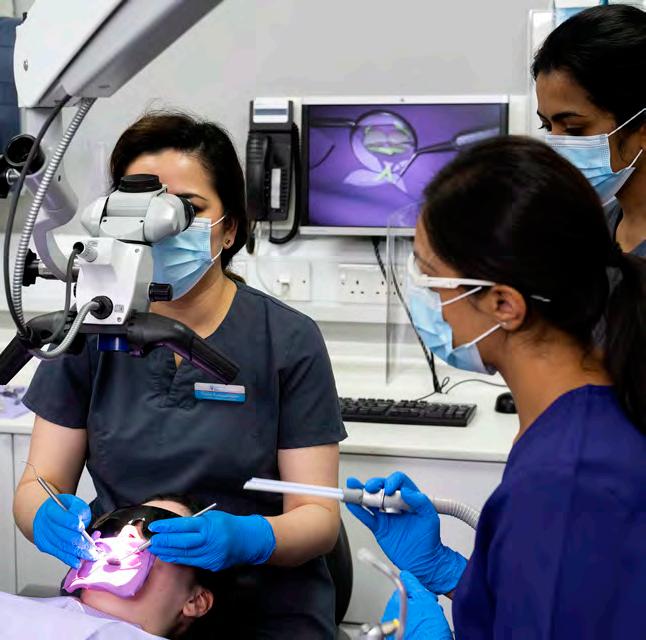
Cross seeding can also happen where, in the right circumstances, these bugs can travel through the root canal into the bloodstream. From there they can circulate throughout the entire body, affecting organs and indirectly causing more inflammation and other forms of damage.
Pioneers past and present - researching the links between Alzheimer’s disease and a healthy mouth
The University of Central Lancashire’s School of Medicine and Dentistry are at the forefront of building the evidence for the possible links between oral health and the risks and development of Alzheimer’s disease and have been for some time.
Dr Shalini Kanagasingam, Senior Clinical Lecturer, School of Medicine and Dentistry at the University is actively investigating these links, following earlier work done within the School.
“I was lucky to come to the University when I did, being able to work with my UCLan PhD supervisor, Dr Sim Singhrao and Professor StJohn Crean, Pro Vice-Chancellor (Research and Enterprise). They were some of the first researchers to link periodontitis and Alzheimer’s after studying post-
Contributors


mortem brains of patients more than a decade ago. The University has been a pioneer in this, and this work is ongoing,” she says.
Alzheimer’s is the most common form of dementia, affecting over 55 million people worldwide. It’s a progressive disease, causing memory loss and behavioural changes, and eventually sufferers need full-time care and support. How the disease initially arises inside us is not yet fully understood.
Dr Flavio Pisani, Senior Clinical Lecturer, School of Medicine and Dentistry says of the origins on Alzheimer’s that there are “multiple pathways to AD initiation, including genetics, traumatic brain injury, comorbidities, pollution, and lifestyles, along with many others.” This is why Alzheimer’s proves such a challenge to prevent and treat.
The disease manifests some distinctive features in the brain that help identify it. One of these is the presence of the ‘amyloid-beta protein’ (Aβ), a protein that accumulates in the brain of Alzheimer’s sufferers. Another is intracellular ‘Tau’ protein.
Shalini’s research has revealed that an enzyme produced by porphyromonas gingivalis, one of the main bacterial species that causes periodontal and endodontic disease, when cross seeded to
the brain, can release the Tau protein from within neurons. This protein then forms tangled fibrous filaments which reattach to the neurons, causing severe damage. And the cycle continues as this damage leads to cell death which releases even more tau protein into the brain, all leading to cognitive degeneration as Alzheimer’s progresses.
Another Alzheimer’s marker, the Aβ protein, was originally thought to be produced by local cells in the brain, so a link to dental health wasn’t considered. Now science knows differently, and it’s accepted that the Aβ protein is released by the body as a response to infection, meaning it can be produced by any cell, including those in the mouth. With poor oral health driven by infection, Aβ protein can flourish within and around infected teeth.
In a further study on extracted infected teeth, Shalini found that microbes associated with endodontic and periodontal disease produced insoluble Aβ protein. This was the first study of its kind to link both root canal infections and gum disease directly to Alzheimer’s. That’s because Insoluble Aβ protein can potentially filter into the blood, where it can then travel anywhere, including to the brain. There Aβ can build up to form neural plaques (biofilm) which, like the Tau protein, can cause inflammation and eventually cell death.
Once in the brain, these microbes can bed in and be difficult for our immune systems to deal with. Flavio has conducted a review of laboratory research into another common mouth bug – Treponema denticola. In his review, he notes that T. denticola has the potential to survive our immune response inside the brain. “Once entry into the brain has been accomplished, the opportunity for T. denticola to build up as mini biofilms could protect it from being attacked by the innate immune system. As an individual species, T. denticola can tolerate high inflammatory milieus within the surrounding neural tissues, such as is seen in AD, so it’s vital to do everything possible to prevent it spreading beyond the mouth in the first place.”
All this may sound frightening but remember that illnesses like this are often caused by a variety of factors, some of which we can do nothing about. We may be born with the genetic potential for a range of diseases, but it doesn’t follow that we’ll develop them. But many of these illnesses carry risk factors that we can mitigate with our lifestyle choices if we’re made aware of the risks and what we can do about them. Making sure we look after our oral health is one thing we can all do.

“As we’re living longer, we’ll need our teeth for longer and dental treatment needs to reflect this,’ says Shalini. ‘Root canal and periodontal treatments can help us keep our natural teeth for longer and there are lots of options before extraction. We shouldn’t just default to ‘oh just take it out, it hurts. “There are lots of new ways to help retain teeth, some of which Flavio and his team are exploring within UCLan’s Community Dental Clinic.”
Both Flavio and Shalini agree that it’s always worth trying to rescue a tooth. That’s because losing teeth can also increase your dementia risk. Studies show that the more teeth you lose, the higher your risk. That’s because having teeth benefits health, the mechanics of chewing work best with all your teeth. Gaps can cause teeth to move around or wobble, especially if you also have gum disease. With less teeth it becomes harder to chew so you’re raising the risk of further infection and inflammation.
“Optimal oral health is a crucial part of maintaining good overall general health. Tooth decay, cavities and gum disease are the conditions that have the main effect on overall health,” Shalini says. “These are what’s known as modifiable risk factors, so why wouldn’t you try to do something about it and reduce your risk of these diseases?”
It’s time to mobilise as one medical profession
Currently the conversation around brain and oral health is limited and siloed, while slowly trickling through, the message needs to get out there. Currently, the Alzheimer’s Society and the World Health Organization (WHO) don’t include oral disease as a modifiable risk factor for Alzheimer’s. That’s because, while there is growing interest in investigating the subject, bigger studies are needed to establish a causal link.
For Flavio and Shalini, funding will make all the difference, to the science and to global health. “We’d love to get sufficient funding for more patient-based evidence so we can say definitively that there’s increased risk with chronic inflammation. But larger scale studies need investment that won’t come cheap,” says Shalini. “We need proportionate funding to reflect the seriousness of the issue, the potential health benefits of proving this link and help people prevent disease. We all trained to save teeth, not take them out. We just need the right funding and support.”
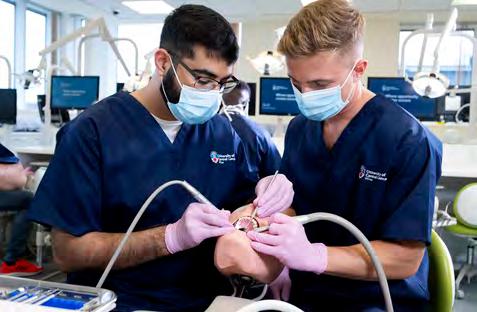
If larger scale research happens, the subject can become a national conversation, with patients and the entire health profession. This is the end goal for Flavio, Shalini and the rest of the dentistry team at the University. “We need public involvement in these studies. Basically, more of what we do in our community Dental Clinic. We’re raising awareness there, especially with patients who already have heart disease or diabetes,” says Shalini. But that awareness also applies to healthcare and medical professionals outside the field of dentistry. “It would be a major step to mobilise us as one healthcare profession, with everyone in the medical community being aware and offering the same message to patients,” she says. “And dentists could be the front line, referring people to their GP if they spot the warning signs.”
“By demonstrating a high level of evidence, the scientific community and medical profession will come on board with us, and we can make a national impact, which could then become an international impact, a global improvement to general health.”
The University’s Community Dental Clinic is based on our main Preston Campus and features clinical facilities which support the training of our dentistry students.
We are fully equipped to give our dental students direct access to practical clinical experience, as well as providing suitable clinical experience for the whole dental team at the same location as they undertake their continued professional development.
If you live in the Preston area and would like to visit the Dental Clinic, contact dentalreception@uclan.ac.uk or 01772 896300
A.J. West chose to study Journalism because he’d always been fascinated with the news and had long dreamed of becoming a newsreader. His decision to major in English Literature was A.J.’s way of improving his own writing and finding an excuse to read incredible books. Little did he know, his choice would lead to extraordinary adventures as well as a shock departure that would ultimately give way to his true passion, writing books.
A.J. said: “I didn’t ever expect to be a published author myself, assuming I wasn’t posh or clever enough, but looking back I can see the author was there from the start really, watching and learning in seminars and lecture halls, but also at the Students’ Union, clubs and house parties.”
During his time at University, A.J. worked at Rock FM (now Heart Radio), scheduling adverts, but he quickly got sacked for spending all his time in the newsroom. It would seem being miffed was to become a particular talent of his and there were many more unceremonious exits yet to come.
“I went out that night to the Flying Handbag in Blackpool (I must have caught a train in spite of my gloom) and when the drag queen asked me what I did for a living, I pretended I was a newsreader,” A.J. said. “Turns out one of the guys at the bar was the editor of the local radio station and that’s how I got my first job.”

A.J. went on the read the news at Dune FM in Southport and got sacked for accidentally swearing on air during a news bulletin. He then moved back home to Milton Keynes and worked for the local radio station before bagging some freelance shifts at BBC Radio 1. Unfortunately, A.J. didn’t stay long and left as he was “too nervous”, stating he was “terrified by the entire experience”. However, not to be disheartened, this job led to a fantastic opportunity and one that A.J. thrived in, a producer and reporter role on the Jeremy Vine Show on BBC Radio 2, where he worked for five years with people he cites as “wonderful”.
Following his time at the BBC, A.J. went to read the news on TV in Northern Ireland, winning awards for his work. He was then horribly sacked for speaking out as a gay man but, not to be deterred, ended up as a contestant on Big Brother where he made the finals.
After Big Brother, A.J. found himself homeless, jobless, penniless and in his words “a little insane”. He said: “I had a pretty rough time of it, trying to make sense of the celebrity world, which is like trying to make sense of a clown shoe filled with spaghetti and drugs. To be frank, it almost did me in, but I met

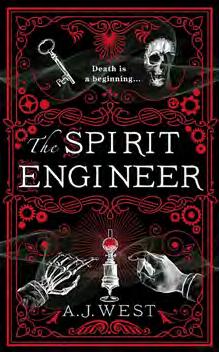
my now husband and amidst so much confusion, I rediscovered myself with the help of friends, including my university friends, and also the discovery of William Jackson Crawford, a professor of engineering in Belfast around the time of the First World War.
“Researching his long-forgotten story, delving into archives and reading endless books about Spiritualist investigators, reminded me who I was and what I enjoyed most: learning about history and writing.”
At this point A.J. decided to focus on being an author and said the skills he honed at UCLan helped him carry out his research and construct a plot for his debut novel, The Spirit Engineer, and gave him a sense of dignity and hope. He said it saved him in a dark time. The Spirit Engineer was a huge success and became a Sunday Times bestselling novel, winning the HWA Debut Crown Award in 2022.
A.J.’s next novel, The Betrayal of Thomas True, is an historical thriller set in the secret molly underworld of 1700s London and is inspired by the great writers he studied at UCLan, from Carol Churchill and Isabel Allende to Dickens and Hardy. It was from these legends, A.J. learned how to build tension, mould characters and bring forgotten worlds back to life. In fact, he did much of his learning in the University library, writing stories to entertain his friends (against their will) when he should’ve been working on assignments. He said his first stories were written in that library and were published in the student newspaper of the time. He said: “I wrote silly stories which were serialised in the paper. Perhaps somewhere in the archives there might be my first ever published story?”
Not content with writing his way through his degree, A.J. also set up the first University of Central Lancashire radio station, Frequency, with his friends Joe and Laura. Something that gave him the experience of live broadcasting, leading to his career at the BBC and on TV. He actually has the honour of being the only journalist to have recorded interviews with MI6 secret agents in Vauxhall HQ and was sadly the last radio reporter to interview the late great Amy Winehouse.
Talking about what impact his time at University has had on his career so far, A.J. said: “I admit I’ve had a pretty eccentric career since graduating, but I’ve been able to enjoy my adventure thanks to those formative three years where I learned how to write, construct an argument, tell a story and, most of all, be a responsible, adventurous and kind grown-up. From the second I stepped off the train at Preston Train Station and received a friendly ‘alright love?’ from the lady in a nearby bakery, I felt completely at home. Preston will always hold a very special place in my heart, and the University will forever be where I learned life’s most important lessons. It was freedom, being so far from home, discovering myself away from family and school. I hadn’t been a hugely happy teenager, suffering problems at home and being too scared to come out, but University suddenly gave me an opportunity to find out who I really was.
He concludes: “Amidst the learning and the growing up, I realised, aged 19, that life is tough, but you can get through if you have good friends around you. The most important lesson University ever taught me. Well, that; and how to use a semi-colon.”
Another graduate who’s taking the publishing world by storm is Kerri Cunningham of Murphy’s Sketches. Kerri, who graduated in 2010 with a BA (Hons) Fine Art has published her second book ‘There is a Season’ under the University’s own publishing house, UCLan Publishing.
You may know Kerri’s work from her illustration of Queen Elizabeth and Prince Philip with the words ‘Hello again Lilibet’, which was published as a response to the Queen’s death. The illustration raised almost £18,000 for the NSPCC.


Our Alumni Achievement Awards have relaunched and now include specific award categories such as sport, business, STEM, and art and creative. You can find the full category list and nomination form here uclan.ac.uk/alumni/achievement-awards. We hope this change makes it easier for you to nominate your University friends for an award.
We love to hear about what you’re doing and want the opportunity to shout about your successes. Please nominate someone who deserves it to give them the chance to join our growing list of proud alumni which includes our most recent awardees, Amanda Chadwick MBE, Rhianne Pope and Samuel Elliott-Black.
Society and Community winner Amanda, who graduated in 2017 with a degree in mental health nursing, was recognised for her selfless charity work and helping to make hospital admissions and major surgery a less scary time for children and young people.
The single mum of three daughters, who has recently been awarded an MBE, from Manchester, came up with the idea of Pyjama Fairies after her youngest child was rushed into hospital with heart failure only two days after being born. The charity, which she founded while a mature student in 2015, makes pyjamas and surgical gowns specially designed for babies and children.

Newspaper journalism postgraduate Rhianne, currently manages the media team at Barnardo’s, the UK’s largest children’s charity. When she worked as a Senior Press Officer for Thames Valley Police, she received a Chief Constable’s Commendation for her work in developing the Force’s response to a sixmonth child sexual exploitation case and subsequent serious case review. Rhianne has managed the British Transport Police (BTP) Press Office through some of the largest major incidents ever faced by the Force, including the Croydon tram derailment in 2016, and BTP’s responses to the terrorist attacks at Manchester Arena and London Bridge.
Art and creative winner Samuel first graduated from the University of Central Lancashire in 2014 with a degree in fashion brand management and worked in the fashion industry until he was made redundant during the first lockdown.
Not only was he unemployed, but Samuel’s dad also unfortunately passed away around the same time. Finding himself at a career and life crossroad, Samuel returned to University and graduated with an MA Fashion and Lifestyle Promotion in 2022 and used his experiences to launch Sam’s Naturally Handmade, a company that makes 100% natural and eco responsible multisensory wellbeing products such as wax melts, candles and teas. The business has recently been awarded the North-West Health and Wellbeing Start-Up of the Year.


We are very grateful to those who give money to the University – to students, research projects, providing facilities and equipment.
This philanthropy is an extraordinary way to thank the University for the difference it made to you, and to give opportunities to the next generation of students coming through University.
In this publication, we have read about alumnus Keith Noble of Forepoint who donated prizes to first year students in Graphic Design for outstanding portfolio work. As well as new scholarships in Journalism which will help with costs of tuition fees, donated by Lara Ayoub and Jeremy Clifford.
We are grateful for the new Sarah Butterworth Enterprise Fund which is enabling students to start up new businesses. The new Vet School has attracted interest from people and organisations who are keen to support this area.
The first students supported by Ashwin Kagdadia’s Scholarship graduated this summer. Talking about his generous donation, Ashwin said: “My philosophy is to put something back into the community. There is no better spiritual satisfaction than to help those less fortunate and if my donation inspires others in the community to do likewise, then I consider it a blessing.”
You can add your support, any amount you can give, however big or small, will make a considerable difference here. There is enormous power in collective action and for this we have the Harris Bursary Fund, which combines all student support donations to help those who need it.
Over a third of our students come from working class homes and amongst them are individuals experiencing extreme financial or social hardship.
The Harris Bursary Fund was established with support from Harris College alumnus, Arthur Whitlock, who studied at the college in the 1950s. Arthur was a successful market trader in Lancashire and became a UCLan Honorary Fellow in 2016 for his local charity work, including his dedication to the Harris Bursary Fund, through the University of Central Lancashire Foundation, to provide emergency help and to prevent students from dropping out of higher education. It helps any student on any subject of study, and as such is a flexible and valuable source of student support.
Help comes in many forms, and we know that many of our alumni help in different ways – advocacy, volunteering, mentoring, advice, internships, graduate recruitment, and by being wonderful ambassadors for this University by being proud of your association, and shining brightly in your own lives, careers and communities. You can leave a gift to the university in your will. There is more information on uclan.ac.uk/giving/legacy
We’ve launched a new alumni online portal which will make it easier to update your details and preferences. If you’re already signed up to hear from us, you will have received a portal invite which asks you to set your own login details. If you haven’t received this, sign up via our website, ensuring you tick to hear from us by email, and you’ll receive a portal link direct to your inbox: uclan.ac.uk/alumni/join-or-update
A tribute to Bernard Pratt
We’re sad to announce that former long-serving Journalism lecturer, Bernard Pratt, has passed away aged 87. During his last few years, he experienced the distressing symptoms from Dementia with Lewy Bodies.

Bernard always spoke fondly of his time at the University and said he was very fortunate to have had the opportunity to continue to share his passion for journalism with students after his time working for The Guardian and Daily Telegraph in his early career. Bernard’s favourite top was his University of Central Lancashire t-shirt, which he wore for over 30 years to many important and memorable events. We send love and best wishes to Bernard’s family and friends.




Careers advice for life
Business support
Events
Sports membership
Library membership
Mentoring and volunteering
Networking
Keep in touch with us via social media, email, phone and in person if you wish.
You can update your contact details at any time via uclan.ac.uk/alumni or by contacting alumninetwork@uclan.ac.uk